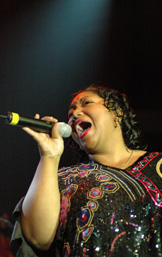The Concert: Soulful Serenades
Students shine on some of the 20th century's great songs.
Belinda McIlvayne '06 performs at the commencement concert.
Vocalist Belinda McIlvaine's Berklee career didn't always go exactly the way she planned it, but she couldn't have hoped for a better conclusion. Twelve years after McIlvaine's first semester in the fall of 1994, she celebrated her graduation by singing two Aretha Franklin classics while a large arena audience cheered wildly. Not a bad way to go out.
But such a moment would have surely fallen into the beyond-wildest-dreams category back in 1995, when, after two semesters, McIlvaine's mother died. The singer had no choice but to leave Berklee and raise her younger brother.
McIlvaine returned to Berklee in 2003, and graduated on Saturday with a bachelor's in music business/management. McIlvain's performances on "Respect"—a duet with fellow graduate Major "Choirboy" Johnson-Finley—and "Since You've Been Gone" demonstrated that, regardless of the path she took, when her big moment finally arrived, she was ready.
The same could be said of the more than 40 student musicians who performed during the course of the May 12 concert at Northeastern University's Matthews Arena. On a night when the college paid tribute to Franklin, singer/songwriter Melissa Etheridge '80, engineer Elliot Scheiner, and tenor saxophonist Andy McGhee, the demands on performers were high, as the repertoire ranged from soul and rock to opera, jazz, and Latin.
Over and over, the musicians rose to the challenge.
Most of the Etheridge tunes were culled from her slew of rock hits, including "I'm the Only One," featuring vocalist Rebecca Muir; "Bring Me Some Water," sung by Stefanie Dominguez; and "Come to My Window," featuring vocalist Katie Locke. A change of pace came in the form of "You Can Sleep While I Drive," an Etheridge ballad that brought harpist/vocalist Maeve Gilchrist to the fore.
The Aretha Franklin songbook provided a talented roster of vocalists a chance to belt out some of the most well-known tunes ever recorded, including hits either written or recorded by the Queen of Soul, including "Rock Steady" and "Dr. Feelgood," featuring Evan Baughman; "(You Make Me Feel Like) A Natural Woman," sung by Nadine Ford; and Stevie Wonder's "Until You Come Back to Me," performed by Ryan Christopher Pinkston. Dawn Royston sang Puccini's "Nessun Dorma," a stunning performance made even more remarkable by her versatility; she later sang a duet with Ali Beaudry on the rocking "I Run for Life," a tune Etheridge wrote as a chronicle of her recent bout with breast cancer.
The recordings Scheiner has engineered provided even more variety, as Johnson-Finley sang Bruce Hornsby's "The Way It Is," Lucas Madrazo sang Van Morrison's "Moondance," Ferras Alqaisi played piano and sang Billy Joel's "The Ballad of Billy the Kid," and guitarist/vocalist Charlie Worsham was the frontman on the Eagles' "Hotel California."
As impressive as all of those performances were, the part of the program that might have been the most meaningful for the Berklee community came when one of the honorees—longtime Berklee faculty member Andy McGhee—took the stage himself. McGhee, who had a long and successful performing career before joining Berklee in the 1960s, performed two jazz standards with a student group. At 78, McGhee played with as much fire and facility as he ever did. When he improvised a solo introduction on "Body and Soul," it was one of the few times during the night when only one instrument was played. It was a poignant counterpoint to the evening's full-band arrangements, as McGhee's single horn filled the cavernous arena.
Then McGhee and the band played "Lester Leaps In" with four of his former saxophone students: Bill Pierce '73, chair of woodwinds; graduating senior Donald Lee; Donald Harrison '83; and Javon Jackson '87. The five hornmen took a series of solos that outlined the history of the saxophone and the college in about five minutes.
All of the vocalists returned to the stage to sing "Soul Serenade," a song from Franklin's 1967 debut recording. Immediately after the show, Etheridge, who was a Berklee student in the late 1970s and early 1980s, climbed onto the stage to congratulate the performers. It was a generous gesture, to be sure, but one that was in keeping with the collaborative spirit of the evening. It was a night of songs created by the honorees, rearranged by Berklee faculty, performed by students, and given enthusiastic support by family members and fellow students in the audience. Everyone played their role and seemed grateful for the opportunity. All that remained for the graduating seniors was to get some rest, collect their diplomas the next day, and start sharing their music with the rest of the world.
